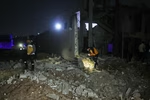
The families of 114 Bosniak and Croat civilians who were killed by members of the Yugoslav National Army (JNA) and Serb paramilitary units have on Wednesday gathered in Mostar to mark 26th anniversary of the war crime.
Oglas
At the very start of the Bosnian war, 114 Bosniak and Croat residents of Mostar were rounded up by JNA soldiers led by ex general Momcilo Perisic and members of Serb paramilitary units on June 13, 1992.
The civilians were beaten, abused, tortured and humiliated and taken to the city’s JNA Sjeverni Logor barracks. After they were killed there, their bodies were thrown into two mass graves at garbage dumps in Mostar’s neighborhoods of Sutina and Uborak.
Although the massacre is seen as the first case of mass war crimes in the area of Herzegovina, nobody has been convicted yet. The case was investigated and mostly documented in the late 90's.
Oglas
The head of an association of family members of the victims, Adnin Hasic, who was 11 years old when his father and mother were killed, said that Bosnia's Prosecutor's Office has failed to do its part in prosecuting the Uborak and Sutina war crimes for 26 years.
According to him, the Hague International Criminal Tribunal for the Former Yugoslavia, canton and state prosecutor's offices have failed.
Hasic called upon Bosnian institution to accelerate the process so that those who committed these crimes and those who ordered them finally face justice. He said the case is stalling for ten years already and that no indictment has been submitted yet.
He also said that the Hague Prosecutor's Office has made a big mistake when it did not charge ex JNA general Momcilo Perisic for the crime, although he was superior to all JNA units and Serb paramilitary units in Herzegovina.
Oglas
The commemoration was also attended by Mostar mayor Ljubo Beslic, who said he was sure that justice will prevail and that those who committed the crimes will be punished. Beslic said that former Hague Prosecutor Carla del Ponte has, during a visit to Mostar, said that the Uborak and Sutina crimes would be prosecuted by domestic courts.
Kakvo je tvoje mišljenje o ovome?
Učestvuj u diskusiji ili pročitaj komentare
Oglas
Kakvo je tvoje mišljenje o ovome?
Učestvuj u diskusiji ili pročitaj komentare
Oglas
NAJČITANIJE
Oglas
Oglas
Najnovije
Oglas
Oglas





 Srbija
Srbija
 Hrvatska
Hrvatska
 Slovenija
Slovenija


























































